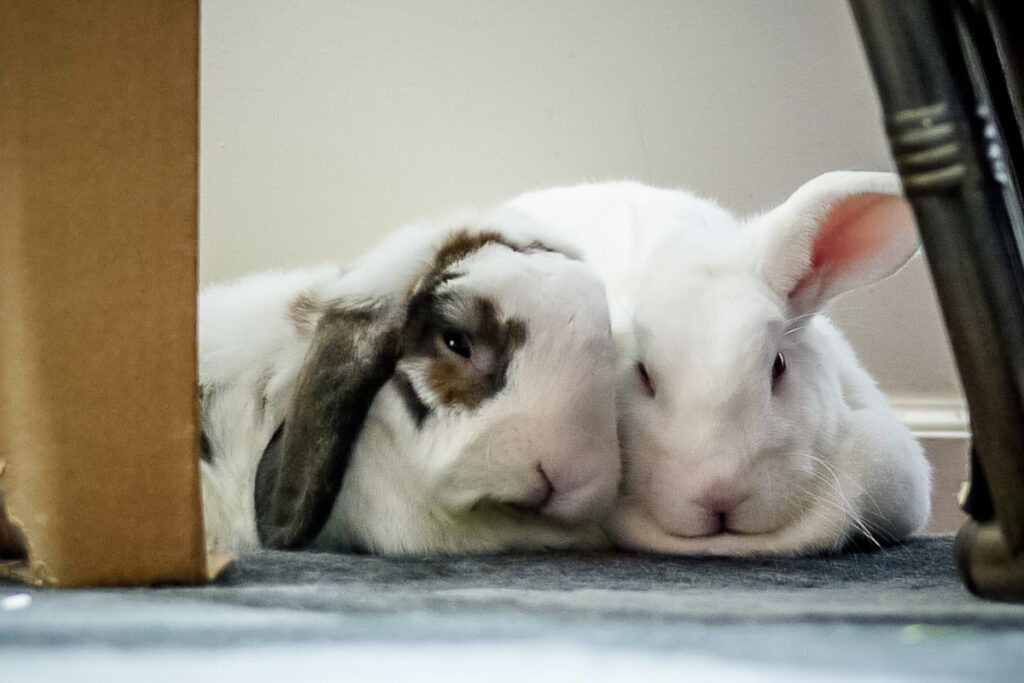I need help,” said the voice on the phone. “I want to keep Buster, but the only apartment I could find allows dogs but not rabbits. Can you find a home for him?”
As the story unfolded I learned that not only was Buster getting on in years, but he was unneutered and had maloccluded teeth. Although reliably housetrained, he wouldn’t be easy to place, but I told the owner I’d do my best. In the meantime I suggested that he approach the landlord again, and try to change his mind.
As any renter knows, finding houses or apartments that accept companion animals of any description can be difficult. Landlords have been burned too many times by casual pet owners whose poorly behaved dogs or cats destroy property and disturb other tenants. And of course, few landlords have had positive contact with rabbits.
What most landlords don’t know is that responsible animal people make better tenants than those who do not have animal companions. Responsibility for animals transfers to all other aspects of a person’s life, resulting in a tenant who is more likely to take care of property and respect the rights of others. The trick, then, lies in making clear to potential landlords what your sense of responsibility towards animals means for them.
The most important step is to eliminate from your mind the possibility of doing anything other than taking your animals with you when you move. Once you have done this, you will change the way potential landlords see you.
Second, unless an advertisement explicitly says “No Pets,” do not ask over the phone if they are accepted. Instead, if a house or apartment sounds promising, make an appointment to see it. Once you have made a good impression on the landlord, he may consider exceptions to existing rules.
And it is possible to bend such rules. There are two dogs, three cats, three rabbits, and two hamsters in our family, and recently Marc and I looked at two rental houses. Both had new wall to wall carpeting. Both had new vinyl in the kitchen and bathroom. Both landlords initially answered “no” to our query about pets. But by the time we finished with them, both landlords ended up offering us the houses, new carpeting and all.
We accomplished this coup by aggressively campaigning for our animals, starting with resumes for each species. The dogs’ resume emphasizes their training and obedience titles, while the cats’ focuses on their prowess with litterbox and scratching-post. The resumes mention our training experience, the animal-related organizations we belong to, and references.
Bunnies on Paper
Planning the rabbits’ resume was more difficult, and indeed, many landlords who accept dogs and cats may still consider rabbits as livestock. Consequently, the resume and its accompanying literature should point out the special qualities of your particular bunny and also educate the landlord about the true nature of rabbits in general.
To begin with, stress the fact that the rabbit is spayed or neutered. Explain briefly how this helps them in litterbox training. If your rabbit is already 100% housetrained, say so; if not, assure the landlord the rabbit will be confined to her cage unless supervised. Explain what bunny-proofing entails. As the landlord is looking over the resume, talk about your rabbit-how she licks your hand and nudges you out of her way, how she loves to play with her toys. In any way you can, help the landlord see your rabbit as a clean, intelligent companion.
Be sure to include as references people who know your rabbit and can talk about her favorably. Start with your veterinarian or your House Rabbit Society representative. If your rabbit was a model tenant in a former apartment, list your landlord there as a reference.
Finally, don’t go to meet potential landlords unarmed. Take along a few articles xeroxed from the hrj-one on housetraining, one on chewing prevention, one on dogs and rabbits, etc.-to give him an idea of what you are talking about.
The resume and literature barrage clearly establish your commitment. The mere fact that you have spent time on a resume shows the landlord that you really care; that you belong to an organization devoted to house rabbits shows that this is not a casual interest. Eventually you will find a landlord whose conclusion will be that if you are willing to go to so much trouble to keep your animals with you, you must be very responsible about their care and training.
Not all landlords will be convinced, of course, and you have to check out a number of places before you find one that will work for both you and your rabbit. In the process of finding it, you will have educated not only your new landlord but also the ones who turned you down along the way. Maybe they’ll remember you and give the next rabbit person a chance.
I haven’t heard from Buster’s owner, but because he signed a lease before campaigning actively for his rabbit, he is unlikely to have much success. Had he approached the situation with a plan of attack, I have no doubt that he could have found a landlord who would welcome Buster; I know too many apartment-dwelling house rabbits to think otherwise. I wish, for Buster’s sake, that his owner had worked a little harder in his behalf right from the start.

